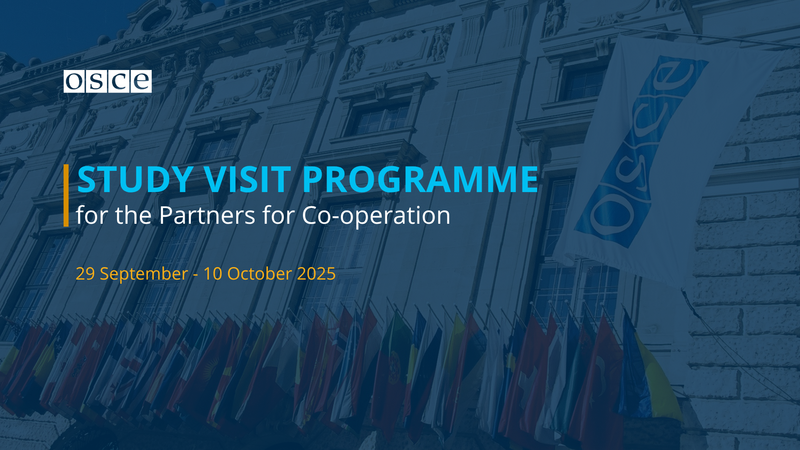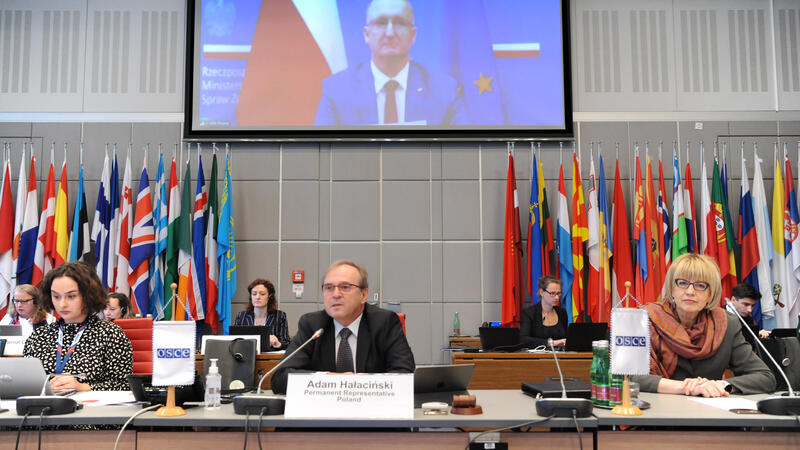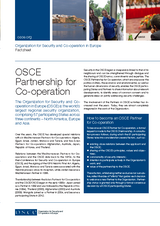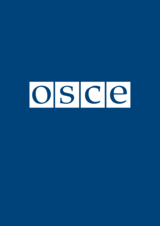-
Our work
-
Fields of work
- Arms control
- Border management
- Combating trafficking in human beings
- Conflict prevention and resolution
- Countering terrorism
- Cyber/ICT Security
- Democratization
- Economic activities
- Education
- Elections
- Environmental activities
- Gender equality
- Good governance
- Human rights
- Media freedom and development
- Migration
- National minority issues
- Policing
- Reform and co-operation in the security sector
- Roma and Sinti
- Rule of law
- Tolerance and non-discrimination
- Youth
- Field operations
- Projects
-
Meetings and conferences
- Summit meetings
- Review Conferences
- Ministerial Council meetings
- Plenary meetings of the Permanent Council
- Plenary Meetings of the Forum for Security Co-operation
- Security Review Conferences
- Annual Implementation Assessment Meetings
- Economic and Environmental Forum
- Economic and Environmental Dimension Implementation Meetings
- Human rights meetings
- Media conferences
- Cyber/ICT security conferences
- Conference of the Alliance against Trafficking in Persons
- Gender equality conferences
- Annual OSCE Mediterranean conferences
- Annual OSCE Asian conferences
- Partnerships
-
Fields of work
-
Countries
- All
-
Participating States
- Albania
- Andorra
- Armenia
- Austria
- Azerbaijan
- Belgium
- Belarus
- Bosnia and Herzegovina
- Bulgaria
- Canada
- Croatia
- Cyprus
- Czechia
- Denmark
- Estonia
- Finland
- France
- Georgia
- Germany
- Greece
- Holy See
- Hungary
- Iceland
- Ireland
- Italy
- Kazakhstan
- Kyrgyzstan
- Latvia
- Liechtenstein
- Lithuania
- Luxembourg
- Malta
- Moldova
- Monaco
- Mongolia
- Montenegro
- The Netherlands
- North Macedonia
- Norway
- Poland
- Portugal
- Romania
- Russian Federation
- San Marino
- Serbia
- Slovakia
- Slovenia
- Spain
- Sweden
- Switzerland – OSCE Chairpersonship 2026
- Tajikistan
- Türkiye
- Turkmenistan
- Ukraine
- United Kingdom
- United States of America
- Uzbekistan
- Asian Partners for Co-operation
- Mediterranean Partners for Co-operation
-
Structures and institutions
- Chairpersonship
-
Secretariat
- Secretary General
- Office of the Secretary General
- Conflict Prevention Centre
- Transnational Threats Department
- Office of the Special Representative and Co-ordinator for Combating Trafficking in Human Beings
- Office of the Co-ordinator of OSCE Economic and Environmental Activities
- Gender Issues Programme
- Opportunities for Youth
- Department of Human Resources
- Department of Management and Finance
- Office of Internal Oversight
- Documentation Centre in Prague
- Institutions
-
Field operations
- Presence in Albania
- Centre in Ashgabat
- Programme Office in Astana
- Programme Office in Bishkek
- Mission to Bosnia and Herzegovina
- Programme Office in Dushanbe
- Mission in Kosovo
- Mission to Moldova
- Mission to Montenegro
- Mission to Serbia
- Mission to Skopje
- Project Co-ordinator in Uzbekistan
- Closed field activities
- Parliamentary Assembly
- Court of Conciliation and Arbitration
- Organizational structure
- About us
Mediterranean Partners for Co-operation

The relationship with its six Mediterranean Partners provides the OSCE with a unique platform to exchange with them experiences and best practices on issues of common interest or concern, from the fight against climate change to strategies for countering terrorism.

Quick links
Partner States
The OSCE maintains privileged relations with 6 Mediterranean Partners for Co-operation:
- Algeria
- Egypt
- Israel
- Jordan
- Morocco
- Tunisia
Events
Past and upcoming events and conferences
News and activities
Latest news and press releases related to the OSCE Mediterranean Partnership
The framework
Regular meetings, conferences and special events are the framework for the OSCE-Mediterranean partnership. This includes the participation of the Partners as observers in the meetings of the Ministerial Council and, on the margins, with the OSCE Ministerial Troika and the Secretary General. They are also regularly invited as observers in Permanent Council and Forum for Security Co-operation meetings and actively take part in other annual OSCE events, such as the Annual Security Review Conference, Economic and Environmental Forum, Human Dimension Implementation Meeting, Annual Implementation Assessment Meeting, and the Annual and Winter Sessions of the OSCE Parliamentary Assembly. Special side events for the Mediterranean Partners are frequently organized on these occasions, while the Parliamentary Assembly holds an annual Parliamentary Forum on the Mediterranean.
The Mediterranean Partners for Co-operation are also regularly invited to send observers to electoral missions of the Office for Democratic Institutions and Human Rights and to second staff members on a voluntary basis to OSCE field operations.
At the 1994 Budapest Summit, the participating States created a Contact Group for the Mediterranean Partners for Co-operation, which in 2019 was renamed the OSCE Mediterranean Partners for Co-operation Group. This informal group meets periodically to facilitate the interchange of information and the generation of ideas.
On an annual basis, the OSCE holds a conference with the Mediterranean Partners, allowing the participants to exchange views and further develop the OSCE's relationship with its Partners. Over the years, the event has attracted increased political attention and become a high-level platform for regional dialogue between the OSCE and the Mediterranean Partners. The annual conferences are also attended by other international organizations, parliamentarians, academics and non-governmental organizations, allowing for a broader, non-siloed debate about ideas and recommendations.
This broader and more inclusive approach is reflected in several initiatives that were born as a result of the intensive OSCE-Mediterranean relationship. These aimed at engaging diplomats, academics, researchers and civil society representatives in a dialogue about the future of comprehensive security in the Mediterranean region. One example of such an initiative is the independent New-Med network, which produced a number of think-tank events and publications relevant to the evolving dialogue and co-operation between the OSCE and its Mediterranean Partners.
Credentials
Heads of Delegations of the OSCE Partners for Co-operation presenting their credentials to the OSCE

H.E. Mohamed Nasr, Ambassador of the Arab Republic of Egypt, OSCE Partner for Co-operation with Ms. Kate Fearon, Officer-in-Charge/Secretary General and Director of the OSCE Conflict Prevention Centre, Deputy Head of the OSCE Secretariat, Vienna, 16 September 2024.
Background
The idea that security in Europe is closely linked to that of States in its Mediterranean neighbourhood, goes back to the Helsinki negotiations in the early 1970s. The 1975 Helsinki Final Act dedicated one chapter to this relationship, detailing such issues as human contacts, information exchange and the work of the media, as well as co-operation on cultural exchanges and education.
From the beginning, this special relationship included Algeria, Egypt, Israel, Jordan, Morocco and Tunisia. Important CSCECSCE
Conference on Security and Co-operation in Europe/OSCE documents following the Helsinki negotiations further underscored the concept, such as the Istanbul Charter for European Security and the Maastricht OSCE Strategy to Address Threats to Security and Stability in the XXI Century. The Milan Ministerial Council in 2018 adopted the Declaration on Security and Co-operation in the Mediterranean, which states that the link between the security of the two regions “has become all the more relevant, as has our co-operation with our Mediterranean Partners, given the growing range of challenges and opportunities stemming from the Mediterranean region and beyond”.
Over the years, the Organization has shared its experience with the Mediterranean Partners on a variety of topics, adapting its agenda to the evolving security context. Initiatives and projects tailored to the Partners’ needs were also developed, including on:
- the environment-security nexus;
- economic empowerment of women;
- youth engagement and participation;
- the fight against terrorism and against trafficking of human beings;
- co-operation on ICT/cyber-security issues; and
- migration and integration policies
Resources
Official OSCE documents, publications, guidelines and other resource material






